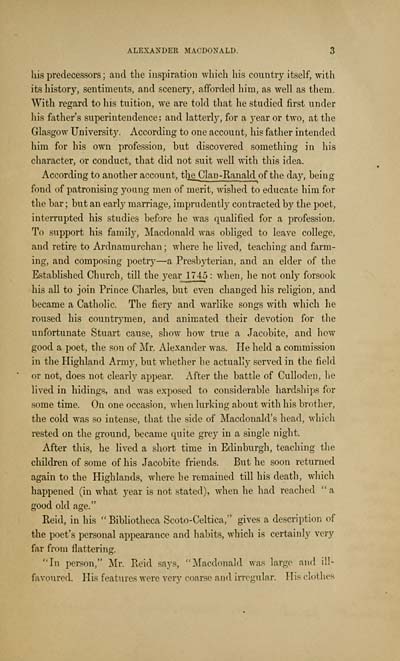Download files
Complete book:
Individual page:
Thumbnail gallery: Grid view | List view

ALEXANDER MACDONALD. 3
his predecessors ; and the inspiration which his country itself, with
its history, sentiments, and scenery, afforded him, as well as them.
With regard to his tuition, we are told that he studied first under
his father's superintendence; and latterly, for a year or two, at the
Glasgow University. According to one account, his father intended
him for his own profession, but discovered something in his
character, or conduct, that did not suit well with this idea.
According to another account, th e_Clan -Ranald of the day, being
fond of patronising young men of merit, wished to educate him for
the bar; but an early marriage, imprudently contracted by the poet,
interrupted his studies before he was qualified for a profession.
To support his family, Macdonald was obliged to leave college,
and retire to Ardnaraurchan; where he lived, teaching and farm-
ing, and composing poetry — a Presbyterian, and an elder of the
Established Church, till the yea r 1745 : when, he not only forsook
his all to join Prince Charles, but even changed his religion, and
became a Catholic. The fiery and warlike songs with which he
roused his countrymen, and animated their devotion for the
unfortunate Stuart cause, show how true a Jacobite, and how
good a poet, the son of Mr. Alexander was. He held a commission
in the Highland Armj^ but whether he actually served in the field
or not, does not clearly appear. After the battle of Culloden, he
lived in hidings, and was exposed to considerable hardships for
some time. On one occasion, when lurking about with his bvfither,
the cold was so intense, that the side of Macdonald's head, which
I'ested on the ground, became quite grey in a single night.
After this, he lived a short time in Edinburgh, teaching the
children of some of his Jacobite friends. But he soon returned
again to the Highlands, where he remained till his death, w-hich
happened (in what year is not stated), when he had reached "a
good old age."
Reid, in his " Bibliotheca Scoto-Celtica," gives a description of
the poet's personal appearance and habits, which is certainly very
far from flattering.
"In person," Mr. Reid says, "Macdonald was large and ill-
favoured. His features were very coarse and irregular. His clothes
his predecessors ; and the inspiration which his country itself, with
its history, sentiments, and scenery, afforded him, as well as them.
With regard to his tuition, we are told that he studied first under
his father's superintendence; and latterly, for a year or two, at the
Glasgow University. According to one account, his father intended
him for his own profession, but discovered something in his
character, or conduct, that did not suit well with this idea.
According to another account, th e_Clan -Ranald of the day, being
fond of patronising young men of merit, wished to educate him for
the bar; but an early marriage, imprudently contracted by the poet,
interrupted his studies before he was qualified for a profession.
To support his family, Macdonald was obliged to leave college,
and retire to Ardnaraurchan; where he lived, teaching and farm-
ing, and composing poetry — a Presbyterian, and an elder of the
Established Church, till the yea r 1745 : when, he not only forsook
his all to join Prince Charles, but even changed his religion, and
became a Catholic. The fiery and warlike songs with which he
roused his countrymen, and animated their devotion for the
unfortunate Stuart cause, show how true a Jacobite, and how
good a poet, the son of Mr. Alexander was. He held a commission
in the Highland Armj^ but whether he actually served in the field
or not, does not clearly appear. After the battle of Culloden, he
lived in hidings, and was exposed to considerable hardships for
some time. On one occasion, when lurking about with his bvfither,
the cold was so intense, that the side of Macdonald's head, which
I'ested on the ground, became quite grey in a single night.
After this, he lived a short time in Edinburgh, teaching the
children of some of his Jacobite friends. But he soon returned
again to the Highlands, where he remained till his death, w-hich
happened (in what year is not stated), when he had reached "a
good old age."
Reid, in his " Bibliotheca Scoto-Celtica," gives a description of
the poet's personal appearance and habits, which is certainly very
far from flattering.
"In person," Mr. Reid says, "Macdonald was large and ill-
favoured. His features were very coarse and irregular. His clothes
Set display mode to: Large image | Transcription
Images and transcriptions on this page, including medium image downloads, may be used under the Creative Commons Attribution 4.0 International Licence unless otherwise stated. ![]()
| Early Gaelic Book Collections > J. F. Campbell Collection > Selections from the Gaelic bards > (27) |
|---|
| Permanent URL | https://digital.nls.uk/77158964 |
|---|
| Description | Volumes from a collection of 610 books rich in Highland folklore, Ossianic literature and other Celtic subjects. Many of the books annotated by John Francis Campbell of Islay, who assembled the collection. |
|---|
| Description | Selected items from five 'Special and Named Printed Collections'. Includes books in Gaelic and other Celtic languages, works about the Gaels, their languages, literature, culture and history. |
|---|

